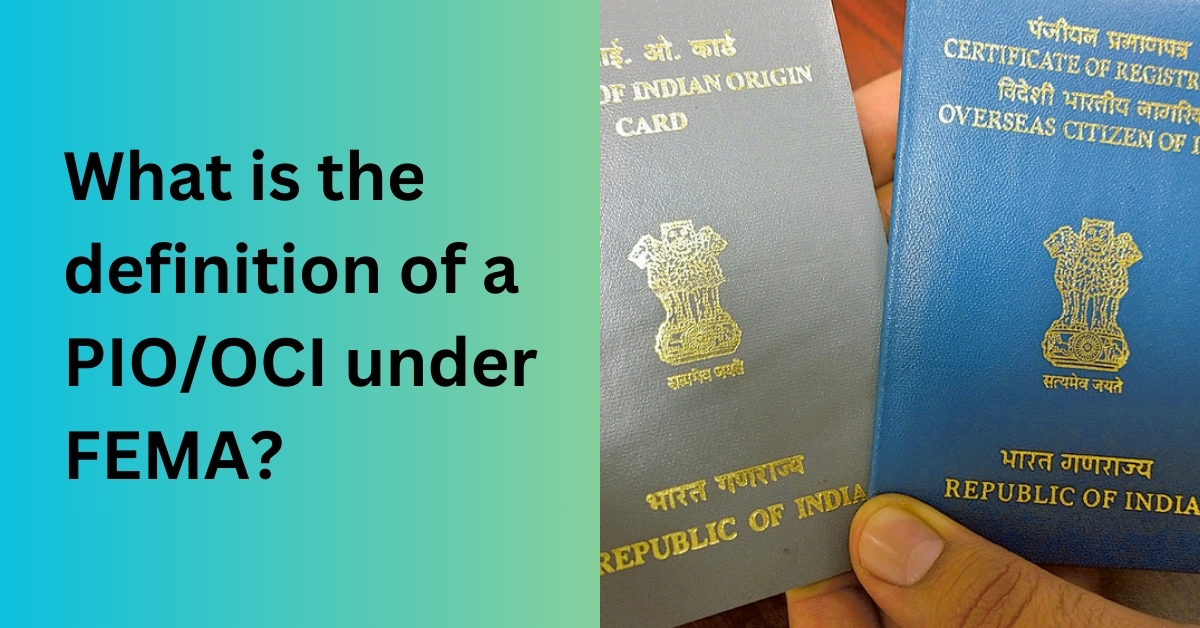What is the definition of a PIO/OCI under FEMA?
PIO and OCI Under FEMA
The Indian diaspora is one of the largest in the world, with millions of people of Indian origin living abroad. These individuals often maintain strong ties to their homeland, and the Government of India has introduced various measures to facilitate their engagement with India. Two such measures are the Person of Indian Origin (PIO) and Overseas Citizen of India (OCI) statuses, defined under the Citizenship Act and the Foreign Exchange Management Act (FEMA). These statuses provide certain rights and privileges to individuals of Indian origin, particularly in property ownership, investments, and banking in India.
Definitions
1. Non-Resident Indian (NRI)
A Non-Resident Indian (NRI) is a citizen of India who resides outside India for various reasons, such as employment, business, or other purposes indicating an intention to stay outside India for an uncertain duration. NRIs enjoy several benefits under FEMA, including the ability to own property and invest in India.
2. Person of Indian Origin (PIO)
The Person of Indian Origin (PIO) scheme was introduced to facilitate the engagement of foreign citizens of Indian ancestry with India. A PIO is defined as a foreign citizen (excluding those from certain countries like Bangladesh and Pakistan) who meets one of the following criteria:
- Has ever held an Indian passport?
- Has parents, grandparents, or great-grandparents who were citizens of India.
- Is the spouse of an Indian citizen or of a person of Indian origin?
However, the PIO scheme was abolished in 2015, and existing PIO cardholders were required to convert their status to OCI.
3. Overseas Citizen of India (OCI)
An Overseas Citizen of India (OCI) is a foreign citizen of Indian origin registered as such under the Citizenship Act. OCIs enjoy the right to live, work, and study in India indefinitely, although they do not have political rights such as voting.
FEMA Implications for OCI
The Foreign Exchange Management Act (FEMA) outlines the rights and responsibilities of OCIs in India, particularly regarding property ownership, investments, and banking.
Property Ownership
- Immovable Property: OCIs can acquire immovable property in India, except for agricultural land, plantations, and farmhouses. The acquisition of these restricted properties requires prior approval from the Reserve Bank of India (RBI). This provision ensures that OCIs can own residential and commercial properties but maintains the restriction on agricultural land to protect India’s agricultural sector.
- Inheritance: OCIs can inherit immovable property from relatives residing in India without needing RBI approval. This provision allows OCIs to inherit property from their family members, ensuring the continuation of family legacies.
Banking and Financial Transactions
- Bank Accounts: OCIs can open and maintain various bank accounts in India, including Non-Resident External (NRE) accounts and Non-Resident Ordinary (NRO) accounts. These accounts allow OCIs to manage their finances in India efficiently. Funds from these accounts can be repatriated abroad, subject to compliance with Indian tax regulations.
- Housing Loans: OCIs are eligible to apply for housing loans from authorized banks and financial institutions in India. This provision facilitates the purchase of residential properties by OCIs, allowing them to invest in real estate in India.
Investments
- Investment in Companies: OCIs can invest in public and private limited companies in India, including equity shares and fully convertible preference shares. They can also invest in Limited Liability Partnerships (LLPs). This provision encourages OCIs to participate in the Indian economy and contribute to its growth.
- Restrictions on Certain Investments: Despite the broad investment opportunities, OCIs cannot invest in small savings schemes or make deposits with private limited companies. They are allowed to subscribe to debentures of public limited companies, providing them with a secure investment option.
Compliance and Reporting
- Regulatory Compliance: OCIs must comply with all provisions of FEMA when engaging in foreign exchange transactions or investments in India. This includes adhering to reporting requirements and obtaining necessary approvals for specific transactions. Compliance ensures that OCIs operate within the legal framework set by the Indian government.
- Tax Obligations: OCIs are subject to Indian tax laws on income generated within India. They must comply with tax regulations, including the Tax Deducted at Source (TDS) provisions during property transactions. This provision ensures that OCIs contribute to India’s tax revenue.
Recent Developments
The Indian government is constantly reviewing the regulations concerning OCIs to make them more conducive to attracting investments and facilitating the involvement of the diaspora in India’s growth. Recent discussions have revolved around potential exemptions for resident OCIs from specific FEMA norms, particularly concerning property acquisition regulations. The Supreme Court of India has sought responses from the government on this matter, indicating ongoing legal considerations regarding OCI rights under FEMA.
Conclusion
The distinction between PIO and OCI statuses under FEMA is crucial for individuals of Indian origin living abroad, as it affects their rights and responsibilities in India. With the abolition of the PIO scheme, the OCI status has become the primary means for foreign citizens of Indian origin to maintain their connection with India. Understanding the provisions of FEMA concerning property ownership, investments, and banking is essential for OCIs to navigate their financial and legal obligations in India effectively. By complying with these regulations, OCIs can contribute to India’s growth and maintain their ties to their homeland.




